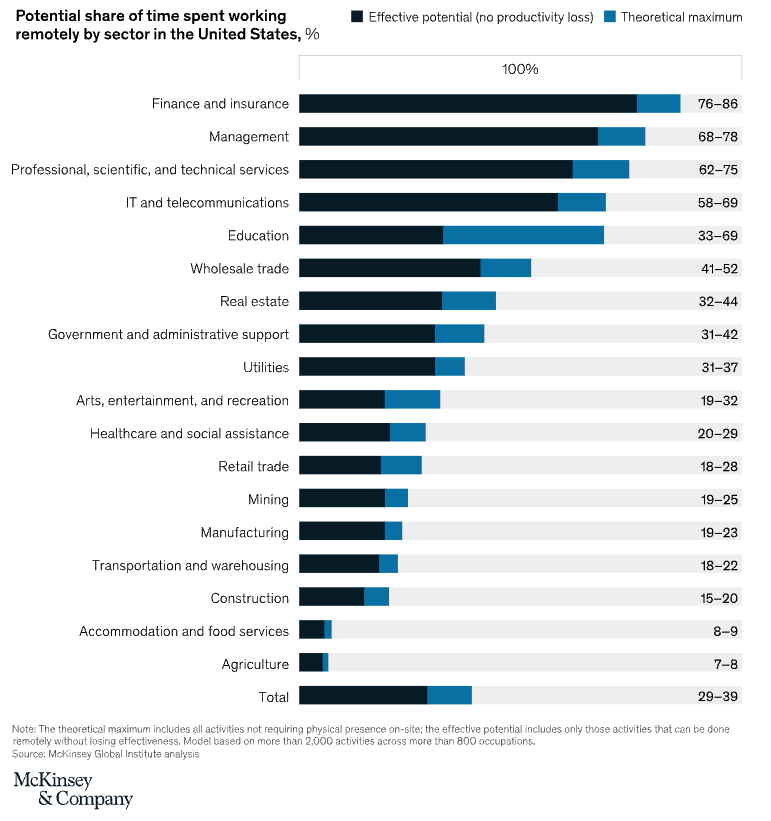- Despite numerous studies showing that remote workers are more productive and on-task than their in-office counterparts, managers often do not trust their WFH employees.
- The financial sector, for example, has several well-known critics of remote work as the ‘new normal.’
- Remote work has pros and cons and is not suited for every role and industry; however, with the right tools in place, bosses can relax and learn to trust those employees not working in the office.
Remote employee. Teleworker. WFH. Telecommuter. Remote worker. Meaning someone who works for a company but does not work in a traditional office.
But, whatever you call it, ‘remote worker’ is slowly becoming a defunct phrase. As the pandemic forced the majority of office workers into some form of WFH, you could argue that every worker is now a remote worker.
Right?
Not necessarily.
A great debate is now raging as to whether every worker should be a remote worker. Whether people actually want remote work. And whether every industry and position is suited to remote work.
Yet, as the effects of the pandemic on the world of work start to recede, remote worker positions are on the rise.
The number of remote workers is expected to double by 2025, reaching more than 36 million in the US alone.
Some companies are embracing a remote worker grant program.
Or, as one expert puts it, “Remote work isn’t going anywhere – companies need to adapt or get left behind.”
This leaves managers with a conundrum. Is remote working right for your business? What about hybrid work? Is a return to the office even necessary? Or wanted by the vast majority of your staff?
In this article, the pros and cons of remote work are evaluated from a productivity perspective, looking into the impact across various industries and roles with recommendations on how managers can leverage remote work to make sure it, well, works for their business.
Remote work’s impact on productivity

Remote work is on (nearly) everyone’s wish list. Research reveals that more than two-thirds of workers want to continue with some form of remote worker options in the post-pandemic world.
Some 72% would prefer a hybrid working model.
Only 12% prefer working in an office setting.
And 32% would like to work from home permanently.
Tech companies are taking the lead in the great remote worker revolution. While a handful wants staff back in the office, Facebook and Twitter have already given employees permission to work remotely in some capacity, permanently.
They’re not alone. Amazon, Capital One, Google, Microsoft, Salesforce and Siemens all reportedly extended their remote worker options into 2021.
Some business leaders have a negative view about remote work. David Solomon, CEO of Goldman Sachs, for example, famously called remote work an aberration”.
So, is remote work a bad or a good thing for your business?
Or something in between?
One of the most important considerations is the impact of remote work on your staff’s productivity.
In many settings, remote work has been shown to increase productivity.
Let’s unpack that sentence a little more. First, let‘s take a look at the many pros of remote work.
7 Advantages Remote Work Brings to Businesses
#1 Time savings

Remote worker jobs mean your staff can leave the daily commute behind. There’s also no need to travel to other cities for work.
Research reveals the average remote worker saves 40 minutes per day. So, your staff can spend less time commuting and more time with their families, relaxing, exercising or working.
#2 Cost savings

And these savings apply to both employers and employees. A remote worker does not have to fork out for the daily commute.
Businesses can dramatically reduce the cost of travel. Also, with fewer people in the office, you can (potentially) reduce your real estate expenses. Not to mention the savings from reduced absenteeism and turnover.
In fact, research shows that employers can save $11,000 per year per remote worker. Employees can save between $2,500 and $4,000 per year.
#3 Increased focus

Remote workers can focus on the tasks that really matter. Research reveals that they spent 12% less time drawn into large meetings and 9% more time with partners and customers during the pandemic.
This gives remote workers more control over their schedules. They can block time in their calendar for personal and business activities alike. Which leads to…
#4 Employee satisfaction

A survey report revealed that remote workers are happier and stay longer in their jobs. They reported feeling less stressed, more focused and had a better work-life balance.
Another meta-analysis of 46 studies, involving more than 12,000 employees, found that remote work can positively affect role stress and job satisfaction.
Further research reveals 70% of employees say remote work has a positive impact on their mental health. Which leads to…
#5 Better retention (and talent)

What does a happier workforce also equal? A loyal workforce.
More than 80% of employees claim work remote options, at least in some capacity, is a major deciding factor when considering a job offer.
74% would quit and work at an organisation that allows them to go remote more often, even if their salary remained the same.
Some 58% of staff working remotely would quit their jobs if required to return to the office.
Also, businesses are using remote work to help head off talent losses.
On a separate note, further research reveals remote working improves information retention.
And address gender inequality in the workforce.
Is there nothing that WFH can’t do?!
#6 Improved trust

Remote work teams benefit from increased trust-building. Having each team member working on their own requires confidence that they will pull through without extensive monitoring.
This trust can strengthen the team and free everyone to focus on their immediate duties.
#7 Environmental impact

With 86% of US commuters driving a private vehicle, fewer cars on the road can only have a positive environmental effect.
All those benefits must equal improved productivity for remote workers, right?
Right (most of the time).
Some 10,000 staff said they thought they were just as productive working from home compared to working in the office.
30% said they were more productive.
But what’s the truth for businesses?
The 2021 Future of Work report from Upwork seems to back up these findings. One-third of hiring managers said productivity has increased since their staff started working from home in 2020.
Another survey found staff performance was boosted by 22% when employees worked from home.
And this study found that working from home for just one day per week boosted employee output by 13%.
It all looks pretty convincing, doesn’t it?
But another study found remote workers are actually less productive and work longer hours.
However, the workers (of the unnamed business in this study) were involved in particularly challenging work. Work tasks that, maybe, were better suited to an office environment.
The possible downsides of remote work

It’s a cautionary tale and highlights the disadvantages of remote working. These include:
#1 Culture crash
Keeping your company culture alive can be difficult when everyone works from home. A survey from Microsoft found cross-group connections dropped by 25%.
#2 Isolation
Loneliness is another threat for remote workers. While there are some technical solutions to keep workers connected, it’s important to prioritise the health and wellbeing of your staff. Otherwise, this could quickly lead to…
#3 Burnout
Studies have found that many remote workers are struggling with growing levels of anxiety and depression at work, solidifying the need for employers to better care for their employees’ mental health.
#4 Distractions
Remote workers do sometimes face issues with distraction and routine. Gen Z is particularly susceptible – with 54% less productive when working from home due to distractions.
So, is the remote worker industry right for your industry?
Is remote right for your business?
Your workers?
Let’s find out.
Are the effects of remote work ubiquitous across industries and positions?

The effects of remote work will differ depending on the industry and tasks your workers face. Remote work is better suited to certain job titles and must be considered in context.
The What’s next for remote work report from McKinsey states: “Our analysis finds that the potential for remote work is highly concentrated among highly-skilled, highly educated workers in a handful of industries, occupations, and geographies.”
“The potential for remote work is determined by tasks and activities, not occupations.”
This is an interesting finding, highlighting the importance of adapting remote work to an individual’s role and responsibilities.
So, who is remote work right for?
Teams working on largely autonomous projects
Projects where team members need limited communication
Teams that handle digital communication well
Teams that are strong with time management and self-direction
The McKinsey report also reveals that finance, management, professional services and information sectors have the highest potential for remote work. And that the potential of remote work is higher in advanced economies.

So, when is remote work inappropriate?
When excessive meetings or manual work are required
When team members don’t handle digital communication well
When many tasks require in-person collaboration
When team members require a lot of direction or are still learning
That said, plenty of traditional industries are adapting to remote work. Some businesses are turning to robotics, artificial intelligence (AI) and automated tools to enhance operations.
One San Francisco-based company, OpenSpace, uses AI to develop navigable 360-degree photos for construction sites, allowing builders and site managers to virtually tour an area and map it to project plans. Stakeholders can also monitor progress remotely and resolve conflicts without face-to-face interaction.
But not every business can (or wants to) work remotely. Here are seven questions to ask, to assess your company’s suitability for remote work.
How will your remote workers remain visible and connected?

Do you feel confident managing remote staff?
Where will your remote workers be based?
What will you do to maintain the positive well-being and health of your staff?
How will you provide learning and feedback opportunities to your staff?
How will you maintain company culture across your remote and in-office staff?
Are there any tasks that are not suitable for remote work?
How can managers leverage remote work to increase productivity?
Research reveals that more than 20% of the workforce could work remotely three to five days a week as effectively as if they were working from an office.
But remote workers still need help and guidance – and managers must be well-suited to lead virtually.
Traditional management plans rarely work for remote staff, and you must change your approach to match the needs of today’s remote staff.
How?
It’s vital to learn how to communicate directly with your team members and encourage proper communication. Here’s how:
7 strategies to improve remote work for employer and worker

#1 Know your team
Certain employees may not be suited to remote work because they cannot be trusted or don’t have adequate technical experience.
A good manager will consider these variables and decide which team member can work remotely.
The ACAS has provided this guidance for managers considering a shift to remote work.
#2 Set a reliable and consistent schedule
Checking in with the appropriate frequency without incorporating excessive and draining Zoom meetings will ensure the team stays productive and cohesive.
Also, you may want to experiment with hybrid working – many are adopting the 3-2-2 working week.
#3 Build a strong company culture
It’s important to create and champion a flexible culture for your remote working initiatives to work.
Personalisation is reportedly key to building a strong remote workplace culture, allowing you to tailor your remote working environment to individuals.
This will increase the usefulness and viability of remote work for your staff. When there are clear guidelines and expectations, remote workers can easily manage their time without the need for constant supervision.
Additionally, employees who believe in the company are more likely to value the trust managers place in them.
This process starts from day one. Make sure you have modernised your onboarding process for remote workers.
#4 Stay connected using tech…
Investing in remote working technology is crucial. Tools like Zoom, Slack and Asana, for example, can help streamline your communication and collaboration efforts.
Don’t just use these tools for work either – the most productive and engaged remote workers during the pandemic were those that frequently offered virtual social work events.
#5 … but beware bossware
Bossware – aka workplace surveillance programs – experienced a surge during the pandemic. But they’re not necessarily a good idea if you want to build trust and respect with your remote worker teams.
These tools allow bosses to monitor workers’ online activity and assess their productivity. They may take screenshots of their screens or log your keystrokes or track your browsing, for example.
The tech companies dipped their toes into the bossware game – and quickly left these murky waters.
Zoom reportedly backtracked on an “attention tracking” setting, alerting a call host if an attendee lost focus during an online meeting for more than 30 seconds.
Microsoft also bowed to pressure over the release of its “productivity score” for its 365 suite. The tool no longer identifies users by name.
Instead, take a more transparent approach where your remote worker is in charge of reporting back to you.
One report in Entrepreneur recommends: “To increase the productivity of remote employees, HR managers focus on obtaining regular reports through collaborative platforms. They make use of virtual workspaces to ensure everyone is on the same page and that the employees provide their work status regularly.”
#6 Don’t forget the red tape
Remote worker state income tax is another factor to take into consideration. Depending on where you live, your tax obligations for remote employees changes.
#7 Redefine productivity
How do you measure productivity? As the world goes remote, you may want to change your approach. Instead of focusing on how long your remote workers are online, measure their outputs and results.
Deciding if remote work is right for you and your team

Remote work is beneficial in many circumstances. But it can have negative impacts if implemented incorrectly.
Managers should work on developing trust with team members, allowing you to leverage remote work to boost productivity across your workforce.
Here’s a quick checklist for managers. Make sure you:
Create a communication strategy for remote workers
Set SMART goals and other important KPIs to monitor productivity
Put the right tools in place to enable collaboration and remote social events
Focus on your company culture and maintain it
Re-evaluate and re-assess your remote working policies
To summarise, you have to trust your remote workers and give them the freedom to manage their work and time.
Otherwise, the benefits of remote work slowly disappear – and so could your top talent.
FAQ
- How do I permanently ask for remote work?
- More and more employees are asking to WFH. One template recommends emailing your boss to ask for a meeting. Then, submit your written request to WFH permanently, outline the benefits of this arrangement and provide a potential schedule to discuss.
- What is the difference between remote work and work from home?
- The terms are often used interchangeably, remote worker meaning someone who works outside the office (that could be in a coworking space, cafe or home).
- WFH tends to just focus on those staff who work from one location – their home.
- What is the best way to work remotely?
- It depends on your role, industry and personal circumstances. Here are some quick tips. In general, it’s recommended to find a routine, have a dedicated workspace, take breaks, set boundaries and be kind to yourself.
- Is working from home good?
- It depends who you ask! But more than two-thirds of workers want to continue with some form of remote worker options in the post-pandemic world.
- What are the pros and cons of working remotely?
- Remote work provides a better work-life balance, reduces commutes, reduces costs (for employers and employees), attracts and retains top talent and increases productivity.
- However, it limits face-to-face interaction, can reduce collaboration and lead to loneliness and isolation. Here are some tips to overcome the WFH blues.
- What is a remote worker?
- A remote worker is a worker who works autonomously and outside of a traditional office setting.
- How do remote workers get paid?
- Many remote workers are employed in traditional jobs, and as such, get paid the same way any office worker might be.
- Employers may need to be aware of other factors though – such as how much remote worker state income tax to pay, which can change depending on your worker’s location.
- What do remote workers need?
- Generally, remote workers only need a laptop and a reliable internet connection, though this will depend on the nature of their work.
- It’s also important to still support and manage your remote workforce.
- Will remote work replace traditional office work in the future?
- For many positions, remote working has the potential to replace traditional office work, though it won’t be able to replace every position.
- Is remote work better?
- In many cases, remote working increases productivity and decreases worker stress. But it’s important to assess its suitability for your business on a case-by-case basis.

 Dr. Gleb Tsipursky – The Office Whisperer
Dr. Gleb Tsipursky – The Office Whisperer Cat Johnson – Coworking Marketing Maven
Cat Johnson – Coworking Marketing Maven Angela Howard – Culture Expert
Angela Howard – Culture Expert Drew Jones – Design & Innovation
Drew Jones – Design & Innovation Andrea Pirrotti-Dranchak – Competitive Advantage
Andrea Pirrotti-Dranchak – Competitive Advantage Jonathan Price – CRE & Flex Expert
Jonathan Price – CRE & Flex Expert Jeremy Fennema – Tech Innovation Alchemist
Jeremy Fennema – Tech Innovation Alchemist







